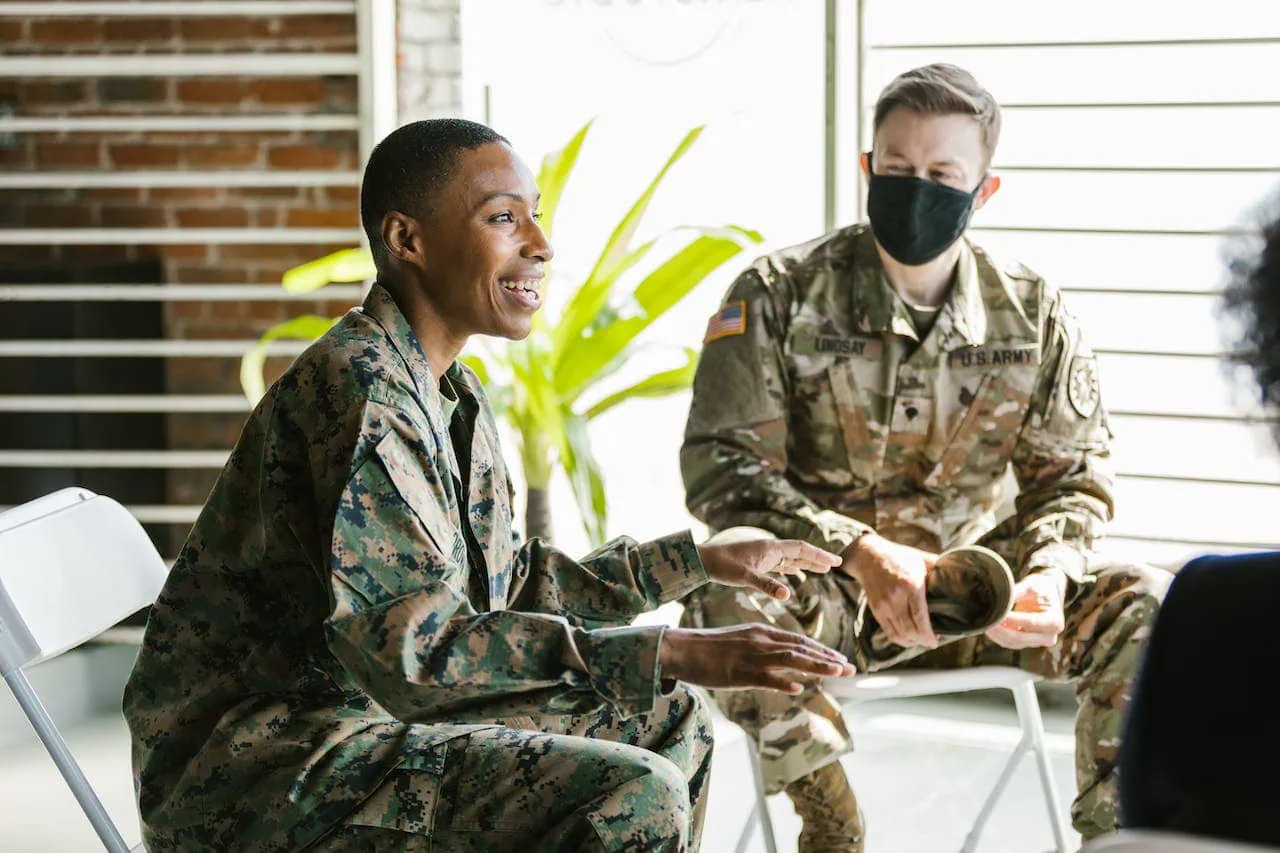
Why Veterans Experience High Addiction Rates
After serving our country, veterans often face challenges when returning to civilian life. Among these challenges, addiction is a prevalent and concerning issue that affects a significant portion of the veteran population. One in ten people in the military has a substance use disorder, according to NIH.
Understanding why veterans experience high addiction rates is crucial in providing them with the support and resources they need to overcome these struggles.
Trauma, PTSD, and Substance Use Disorder
Many veterans return from deployment after experiencing traumatic events that may cause post-traumatic stress disorder (PTSD) or other psychological issues. The mental health toll of combat, witnessing violence, and loss of peers can manifest in many ways, including nightmares, hypervigilance, and intrusive memories.
To cope, some people turn to substance use. Sometimes, this is a form of self-medication, seeking temporary relief from their emotional distress or as a way to relax. For some, it becomes a way of life and leads to more problems, including substance use disorder.
Veterans, Substance Use Disorder, and Pain Management
Service-related injuries often result in chronic pain. Veterans are commonly prescribed opioid medications for moderate to severe pain. The over-prescription and misuse of these drugs can lead to dependency and addiction.
People who have co-occurring disorders like PTSD may find themselves trapped in a cycle of pain and substance use. They may continue to use their substance of choice even though it is causing them problems.
Military culture often involves socializing in environments where alcohol and other substances are readily available. This culture of drinking and camaraderie can persist even after leaving the service, leading veterans to continue using substances as a way to connect with others or cope with boredom.
Other Unique Challenges Veterans Face
Some veterans may have trouble reintegrating into civilian life after military service. It can be incredibly challenging. Many people returning from active services need help finding employment, establishing social connections, or adjusting to the pace and structure of civilian society.
Feelings of isolation, purposelessness, and alienation can contribute to substance use as veterans seek ways to cope with the stress and uncertainty of their new lifestyle.
Despite ongoing efforts to raise awareness and reduce stigma, veterans often face significant barriers to seeking addiction treatment. Fear of judgment, concerns about confidentiality, and a lack of understanding about available resources may prevent people from getting the help they deserve.
Addressing the high addiction rates among veterans requires a comprehensive approach to addressing biological, psychological, and social factors that play a part in their addiction.
By recognizing the challenges faced by veterans and providing them with the necessary support, we can work towards reducing addiction rates and helping those who have served our country receive the care and assistance they deserve.
Which Substances Are Most Commonly Misused By Veterans?
Veterans can struggle with addiction to a variety of substances. Still, certain drugs are more commonly associated with use due to various factors, including accessibility, coping mechanisms, and underlying mental health conditions. Here are some of the most widely abused drugs among veterans and reasons why:
- Alcohol: Alcohol misuse is prevalent among veterans. It is partly due to a culture of drinking in the military and the stressors associated with deployment and combat. Many veterans turn to alcohol as a way to cope with trauma, PTSD, depression, anxiety, or to numb emotional pain. Alcohol is often readily available and socially acceptable, making it a popular choice.
- Prescription Opioids: Doctors often prescribe opioid medications to manage chronic pain resulting from service-related injuries. Some people also use opioids to cope with psychological distress, such as symptoms of PTSD.
- Benzodiazepines: Benzodiazepines, commonly used for anxiety or sleep issues, are often used alongside alcohol or opioids. Benzos can lead to addiction, mainly when used long-term or in higher doses than prescribed, and can have dangerous withdrawal symptoms.
- Stimulants: Stimulant medications like Adderall or Ritalin are sometimes prescribed to veterans for conditions such as attention deficit hyperactivity disorder (ADHD). However, people often misuse stimulants, especially people who seek increased alertness or improved performance, both during military service and in civilian life.
- Marijuana: While marijuana use among veterans may not be as directly tied to combat experiences, it is still prevalent, especially among those dealing with PTSD, chronic pain, or other mental health conditions. Some veterans may turn to marijuana as a way to self-medicate, seek relief from symptoms, or as a means of relaxation. Many marijuana dispensaries advertise their products as a natural way to cope with PTSD symptoms; however, for some people, the drug causes additional problems.
- Cocaine and Methamphetamine: While less common than some other substances, cocaine and meth use can still occur among veterans. People taking this drug are usually seeking heightened stimulation or euphoria. Some people may use these drugs to cope with the challenges of civilian life.
Veterans may be drawn to certain substances due to a combination of factors. These include the availability of prescription medications, coping mechanisms for trauma and mental health conditions, and social or environmental influences.
Addressing addiction among veterans requires a holistic approach that understands the unique experiences and needs of this population, including providing access to comprehensive mental health care, substance abuse treatment programs, and support services.
Getting Help for Substance Use Disorder
Do you or somebody you love struggle with substance use?
In Baja Sur California’s serene and safe surroundings, addicted people can find solace and support tailored to their needs. Our holistic approach addresses not just symptoms of addiction but also the underlying causes and helps the body, mind, and spirit to start a healing journey to recovery.
Our treatment center is an environment that prioritizes physical, mental, and emotional well-being. Every aspect of our program helps promote wellness as individuals begin recovery.
With compassionate care and evidence-based practices, we empower veterans to heal from their addictions and rediscover hope, purpose, and resilience. Join us on this journey by calling us today at 1-888-984-0758 or contacting us via our website.
